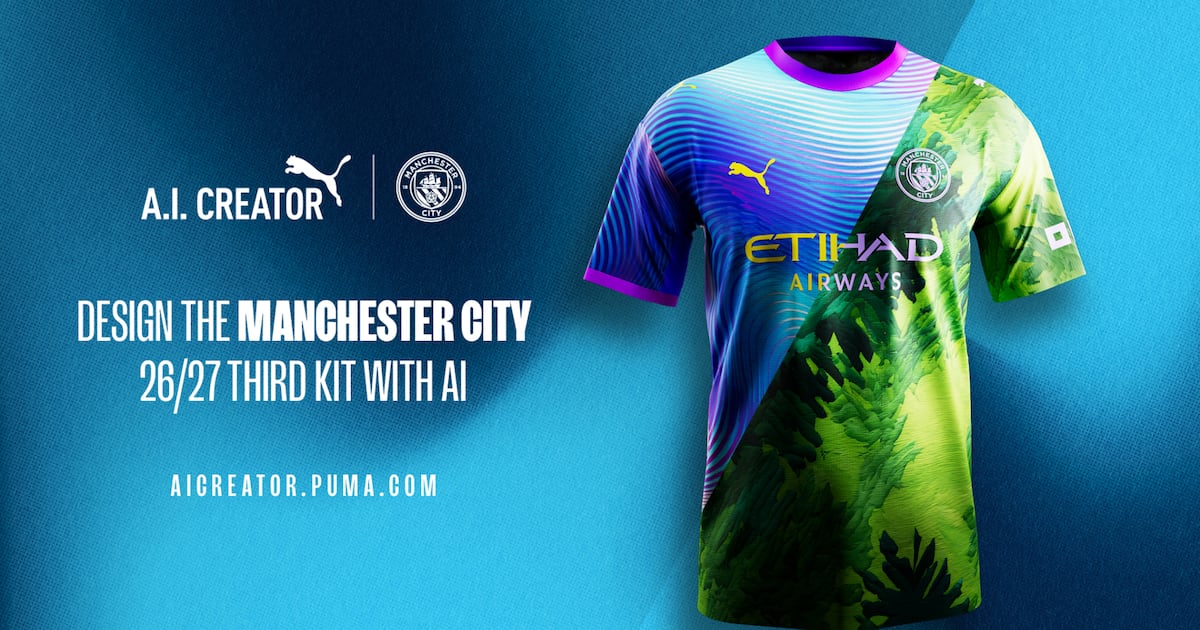Puma is using AI to bring Manchester City fans closer to the game.
On Monday, the company is launching a platform that will let the football clubâs followers use generative AI to design a new uniform for the team. One of those designs, to be selected through a contest, will become Manchester Cityâs third kit, typically worn in around 10 to 12 matches, for the 2026 season, according to Puma.
The platform leverages generative AIâs ability to let users create high-quality imagery solely through text prompts. Users will be met with a field where they enter text describing their idea, producing four virtual renderings of a Manchester City jersey in that style. They can edit the generated shirts with simple tools, enlarging or shrink their design as it appears on the uniform, choosing collar options like a crew neck or V-neck and changing the colours on different parts of the shirt, from the main body to the under arms and cuffs, among other customisation options.
Ivan Dashkov, Pumaâs head of emerging marketing technology, said the goal is to make it easier to get fans involved. Football fans can be deeply passionate about their teamâs kits, but when Puma has held similar competitions in the past, contestants had to have drawing skills or be proficient with software like Illustrator or Photoshop in order to create polished designs.
âWe want to really break down those barriers and make it easy for anybody to come in and design,â Dashkov said. âLiterally, you can make a kit in under two minutes, which I think is very exciting.â
Puma joins a host of companies seizing on generative AIâs design abilities. Brands including Norma Kamali, Collina Strada and Mango are embracing the technology to create their own collections, while a number of start-ups are using it to power fashion design platforms. Others have jumped on its ability to let everyday consumers visualise concepts without needing to do the work of drawing them. The start-up Arcade recently introduced a site where users design jewellery that they can then buy and have made.
Many of these efforts make use of the open-source AI models being built by organisations such as OpenAI and Midjourney.
While there are other online platforms for making football kits, Dashkov said they tend to be more intricate and often require time to produce a good result. With AI, generating an idea is much faster.
For its platform, Puma partnered with the AI studio Deep Objects, founded by the creative agency FTR, which has worked with Puma on a number of prior projects, including the brandâs runway shows in recent years. The firm previously introduced its own AI platform to allow consumers to create sneaker designs.
Entries in the contest to design the Manchester City kit will go through a series of voting rounds by fans and a panel of judges from Puma and Manchester City. (The winner will have to adhere to FIFAâs strict rules for on-field uniforms.) The top 10 designs will receive prizes, and the winner design will get a grand prize that includes a travel package to Manchester Cityâs home stadium and Puma gifts.
Dashkov said Puma and Manchester City have already used the platform themselves to create a new kit for the teamâs goalies. Theyâre set to debut in a real match this January.
Puma is also thinking about other opportunities in which fans or consumers could co-create products using AI, though Dashkov said itâs too early to say what might come next.
âThis is our first run at it, so we want to see how this goes [and] get those learnings from it before we commit to what weâre going to do for the second generation,â he said.

